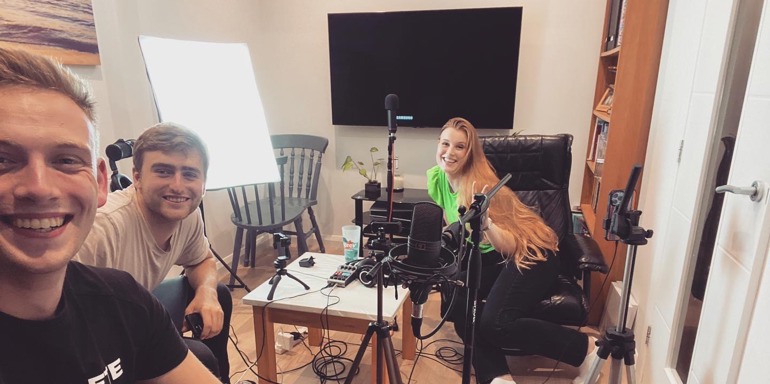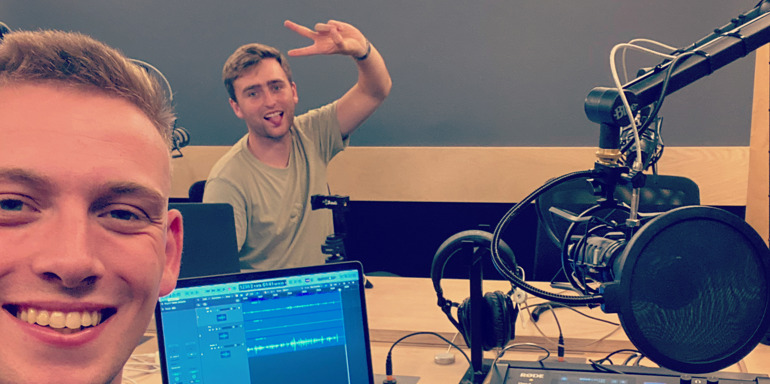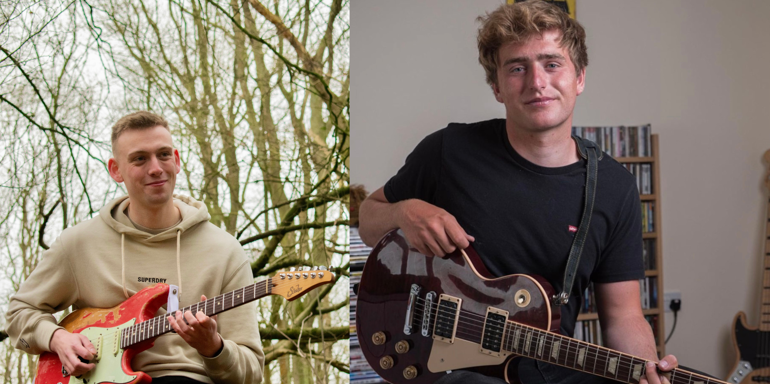Will Dawson studied Popular Music with a foundation year between 2018-2022, and Tristan Taylor was on our Popular Music course between 2018-2021. After graduating, they banded together to form OpenBack: a weekly podcast that discusses the highs and lows of the music industry.

Will and Tristan recording an episode with their first industry guest, Grace George
What inspired you to start the podcast?
Leaving education is nerve-racking, and the music industry is full of uncertainty, not everything goes as planned. There are factors that you have to consider that you might never have come across before. We were having conversations about our futures and the music industry anyway; with friends, family, and each other, and it just made sense to share these chats with others who may be in the same situation.
The truth is life after graduating can be hard, especially in creative fields where it takes time to build a portfolio and network. This can lead to a very isolating feeling. We found there was a real lack of material out there talking about this and we wanted to change that.
So, what can listeners expect from this new podcast?
Honest weekly episodes, discussing the good the bad and the ugly of life after graduating in the music industry. Regularly interviewing industry professionals, shedding light on their experiences and paths to success. Over 25 Episodes are already available to stream on all major podcast platforms for free. We've covered a wide variety of topics, many of which have surprised us and changed our perspective on things.
What do you hope the podcast will achieve?
We hope it will better prepare others for entering the world of music by providing an honest insight into what this is really like. Beyond this, we hope our conversations with industry professionals will help us and our listeners find a way to success, whatever that means to them.
What has the response to the podcast been so far?
The response has been super positive! With a growing list of weekly listeners all over the world, it’s amazing to see how many people relate to and find value in our chats. Although finding new listeners can be hard. We don’t have a big budget, only what we make from our day jobs to spare on investing in the podcast.
So, what does the future look like for OpenBack? Can you share any upcoming plans you have.
We’re constantly arranging new guests and are hoping to introduce some new formats really soon, including mini-interviews with artists at gigs. Due to the nature of how we do things most episodes are released within days of recording, so it’s often quite spontaneous. We like it that way as it keeps all the content super current to what we are up to.

Will and Tristan in a studio before they had their own equipment.
How did you find the podcast-making process? Did you find anything difficult and how did you overcome these hurdles?
It's important to note that every podcast’s podcast-making process is different. We try to be very authentic and honest and as such, aim to keep editing to a minimum. For example, we include the moments where we misunderstand each other as these are where new ideas and perspectives emerge naturally.
By far the hardest hurdle is the logistics. We both work full-time jobs, often with 12-hour days, silly shift patterns, and working in different parts of the country. Finding time every week when we are both available is a huge task and often results in hundreds of miles of driving, especially when there are guests involved. To overcome this we have built a fully portable recording setup, so we can record on the move in a variety of locations.
What has been your favourite podcast moment so far?
Recording an episode with Russell Lissack of Bloc Party was pretty surreal. This is someone who has played big world tours, and stadiums and had award-winning albums. Russel is incredibly humble and his coming on the podcast really helped us out.
Do you have any top tips to share with those interested in starting their own?
Do it because you have something you have to say and are passionate about sharing it. Also, don’t buy expensive gear. The ‘Zoom Podtrack’ is awesome, portable and does everything you need. Buy decent dynamic microphones (ZDM1 podcast mic pack). Condenser microphones seem like a good idea but they are too sensitive outside a studio setting.
It’s hard, but try to be authentic. People like listening to personalities first and foremost.

Will and Tristan
How did your time at Leeds Conservatoire help you develop your skills?
The podcast is about our lives as musicians, we use the musical skills we learnt at the conservatoire every day. From theory and performance to production, it's all relevant and can be applied to so much more than just music.
We both went to lots of the masterclasses, and still reference so many of the things we learnt in those sessions now. Some of the most inspiring masterclasses were those which didn’t immediately seem relevant to us!
Both of us found our 1:1 tutoring sessions were incredibly formative. We were able to build up personal relationships where we learnt more than just our craft. We were able to quiz our tutors on their perspectives, experiences and methods.
What was your favourite thing about studying at Leeds Conservatoire?
Leeds Conservatoire is a melting pot of talent, ambition and creativity. Use it for as long as you’re there. You have access to people with every skill you could possibly imagine to help you write and create amazing work.







